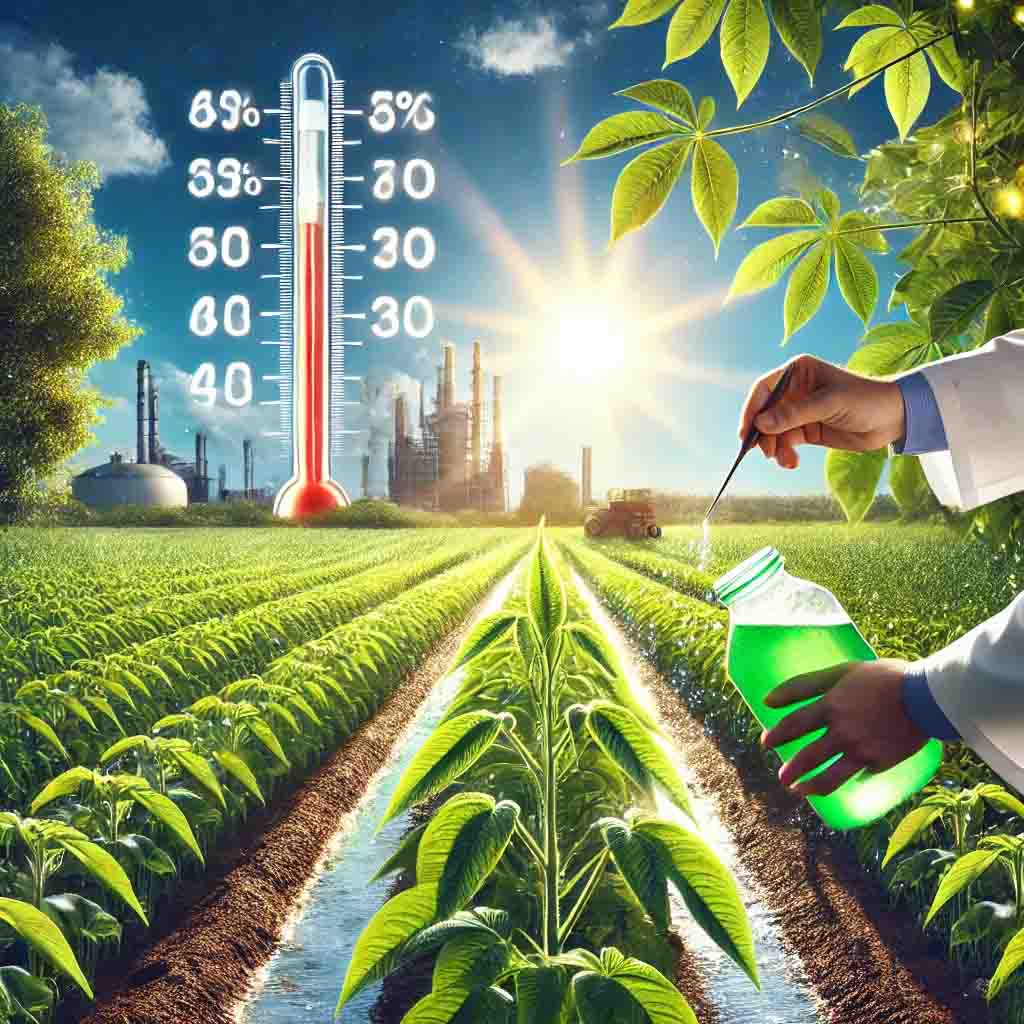Heat stress is a significant challenge for plants, especially in regions experiencing high temperatures. Using Ethanol to Help Plants Better Handle Heat Stress is an emerging strategy to improve plant resilience under such conditions. Ethanol, a simple alcohol, has shown promising potential in enhancing plant tolerance to heat by modulating cellular functions and protecting plants from damage. In this article, we explore how ethanol for heat stress in plants can serve as an effective tool for agricultural productivity, offering solutions for crops facing temperature extremes. Read on to discover the science behind this approach.
Understanding Heat Stress in Plants
Heat stress in plants occurs when they are exposed to prolonged periods of excessive heat, typically above the optimal temperature for growth. This stress disrupts normal physiological functions and can severely affect crop yields and plant health. When plants experience heat stress, their cellular processes, such as photosynthesis, transpiration, and nutrient absorption, are hindered. The plants may close their stomata to conserve water, leading to reduced carbon dioxide intake and, consequently, lower photosynthetic activity. Heat stress also causes the production of reactive oxygen species (ROS), which can damage plant cells and tissues. In severe cases, it can lead to leaf burn, wilting, and premature aging of the plant. Moreover, the plant’s ability to produce essential proteins and enzymes needed for growth and repair is compromised.

To cope with heat stress, plants may employ natural mechanisms like heat shock proteins, but these may not always be sufficient. This is where external interventions, like using ethanol, can play a crucial role in helping plants better handle extreme heat by improving their cellular resilience and adaptive responses.
The Role of Ethanol in Enhancing Plant Heat Tolerance
Heat stress significantly impacts plant growth, leading to reduced productivity and growth rates. In recent years, the use of ethanol has gained attention as a potential solution to help plants better tolerate heat stress. Ethanol, a natural alcohol, has been shown to play a role in enhancing the heat tolerance of plants through various mechanisms that increase cellular resilience and improve stress response.
1. Ethanol’s Effect on Plant Cellular Membranes
One of the primary ways ethanol helps plants tolerate heat stress is by stabilizing cellular membranes. During high temperatures, plant cell membranes can become more fluid and lose their integrity, causing leakage of essential cellular components and disrupting metabolic processes. Ethanol has been shown to help maintain membrane stability by altering the properties of membrane lipids, preventing cellular damage, and helping the plant maintain vital functions under stressful conditions. This improved membrane structure ensures that plant cells retain their structural integrity even during periods of high heat.
2. Enhanced Antioxidant Activity through Ethanol Treatment
Heat stress often triggers the production of reactive oxygen species (ROS), which can cause oxidative damage to plant cells. Ethanol treatment has been shown to enhance the plant’s antioxidant defense system, which helps neutralize ROS and minimize cellular damage. Ethanol-induced antioxidant enzymes, such as superoxide dismutase (SOD) and catalase (CAT), are more actively produced, providing the plant with better protection against oxidative stress. These enhanced antioxidant systems contribute to the plant’s ability to manage oxidative stress, repair cellular damage, and improve overall heat tolerance.
3. Improved Water Regulation and Reduced Transpiration
High temperatures can lead to excessive water loss in plants through transpiration, exacerbating the effects of heat stress. Ethanol treatment can help regulate water loss by improving the plant’s stomatal closure mechanism. Stomata are small pores on plant leaves that control the exchange of water vapor and gases like carbon dioxide. When exposed to heat stress, plants often close their stomata to conserve water, but excessive closing can limit carbon dioxide intake for photosynthesis. Ethanol helps regulate this process, ensuring that plants can maintain a balance between conserving water and allowing enough gas exchange for efficient photosynthesis. This regulation helps plants survive periods of heat stress without excessive water loss or diminished photosynthesis.
4. Ethanol’s Role in Heat Shock Protein Expression
Heat shock proteins (HSPs) are essential for protecting plant cells from damage caused by heat stress. These proteins act as molecular chaperones, helping other proteins maintain their proper structure and function under high temperatures. Ethanol treatment has been shown to upregulate the expression of heat shock proteins in plants, thereby enhancing their ability to cope with thermal stress. By improving the plant’s ability to produce and maintain functional proteins under heat stress, ethanol contributes to increased heat tolerance and overall plant resilience.

5. Ethanol and Plant Growth During Heat Stress
In addition to its protective effects, ethanol can also promote continued plant growth under heat stress conditions. Ethanol treatment has been shown to improve root development and enhance nutrient uptake, both of which are crucial for plant growth during periods of heat stress. The increased root growth allows plants to access deeper water sources, while improved nutrient uptake supports the plant’s metabolic processes, helping it recover more quickly from stress.
Alternatives to Ethanol for Managing Plant Heat Stress
While ethanol has shown promising effects in enhancing plant heat tolerance, several alternative methods are available to manage heat stress in plants. These alternatives include:
Plant Growth Regulators (PGRs): These chemicals influence plant growth and development, helping plants better cope with heat stress. They can enhance root growth, improve water retention, and reduce leaf temperature during high heat;
Exogenous Osmolytes: Compounds like proline and glycine betaine are used to stabilize plant cells under stress. They help maintain cell structure and prevent the denaturation of proteins during extreme heat;
Antioxidants: Natural antioxidants, such as ascorbic acid and glutathione, protect plants from oxidative stress caused by heat. These compounds neutralize free radicals that damage plant cells during heat exposure;
Acclimation through Water Management: Proper irrigation techniques, such as deficit irrigation or the use of mulches, can regulate water stress and improve plant tolerance to high temperatures;
Microbial Inoculants: Certain beneficial microbes can improve heat tolerance by promoting plant health and enhancing soil nutrient availability.
While these methods are effective in reducing heat stress, their success depends on the specific plant species and environmental conditions. Each solution can be tailored based on the plant’s needs and the severity of heat stress.
Ethanol’s Mechanism of Action: A Closer Look at Plant Resilience
Ethanol helps improve plant resilience to heat stress by influencing various cellular processes. When plants face high temperatures, ethanol interacts with cellular membranes, enhancing their stability. High heat can cause membranes to become more fluid, disrupting cell integrity. Ethanol helps maintain membrane integrity, preventing leakage of essential components and ensuring the plant’s cellular functions remain intact. Additionally, ethanol boosts the plant’s antioxidant defense system. Heat stress often leads to the production of reactive oxygen species (ROS), which can damage plant cells. Ethanol stimulates the production of antioxidant enzymes like superoxide dismutase (SOD) and catalase (CAT), neutralizing ROS and reducing oxidative damage.
Ethanol also helps regulate water loss through its effect on stomatal behavior. By improving the plant’s ability to close stomata efficiently, ethanol reduces excessive transpiration during high heat, helping conserve water while still enabling necessary gas exchange for photosynthesis. Through these mechanisms, ethanol strengthens the plant’s overall ability to withstand and recover from heat stress, supporting plant growth and productivity under challenging conditions.
Conclusion
In conclusion, using ethanol to help plants better handle heat stress offers an innovative and effective approach to improving plant resilience under extreme temperatures. Ethanol works by enhancing the plants’ ability to regulate heat, protect cellular structures, and reduce damage caused by stress. While ethanol presents a promising solution, it is important to consider alternative methods, such as plant growth regulators, antioxidants, and proper irrigation techniques. By combining these approaches, we can create a more comprehensive strategy for managing heat stress, ultimately leading to healthier, more resilient crops in the face of climate change.
FAQ: Using Ethanol to Help Plants Better Handle Heat Stress
How do you fix heat stress in plants?
To fix heat stress in plants, provide adequate water, use shade nets, and apply protective chemicals like ethanol. Adjusting irrigation, reducing plant exposure to direct sunlight, and applying stress-relieving treatments can help restore plant health.
How does ethanol react to heat?
Ethanol, when applied to plants under heat stress, helps stabilize cellular structures, reduce water loss, and enhance heat tolerance. Ethanol acts as a stress mitigator, improving the plant’s ability to cope with high temperatures and preventing damage.
How do plants respond to high temperature stress?
Plants respond to high-temperature stress by activating protective mechanisms like heat shock proteins, reducing water loss, and slowing down metabolism. However, prolonged exposure can cause damage to cellular structures, reduce growth, and affect yield.
Is ethanol safe for all types of plants under heat stress?
Yes, ethanol is generally safe for most plants, but it’s crucial to use the correct concentration. Excessive ethanol may cause damage, so it’s essential to follow recommended guidelines for application.
Can ethanol be used as the only solution for heat stress in plants?
While ethanol can be beneficial, it is usually most effective when combined with other heat stress management practices like proper watering, shading, and environmental adjustments.
How does ethanol help improve plant productivity in hot climates?
Ethanol increases the plant’s ability to withstand high temperatures by enhancing cellular processes and preventing damage. This allows the plant to maintain productivity, even under hot conditions.
Can ethanol treatment be repeated for plants experiencing ongoing heat stress?
Yes, ethanol treatment can be repeated periodically, but care should be taken to monitor plant response and avoid overuse, which could lead to stress or damage.

